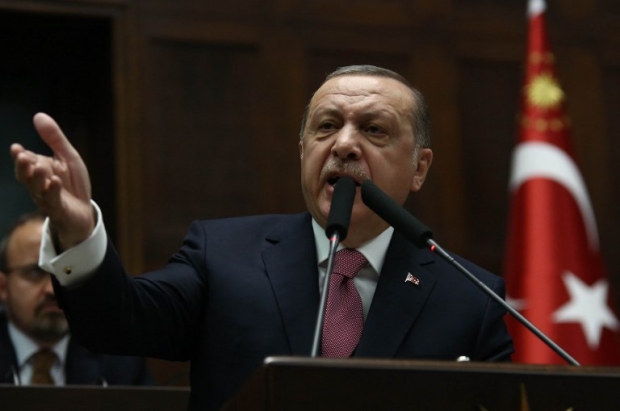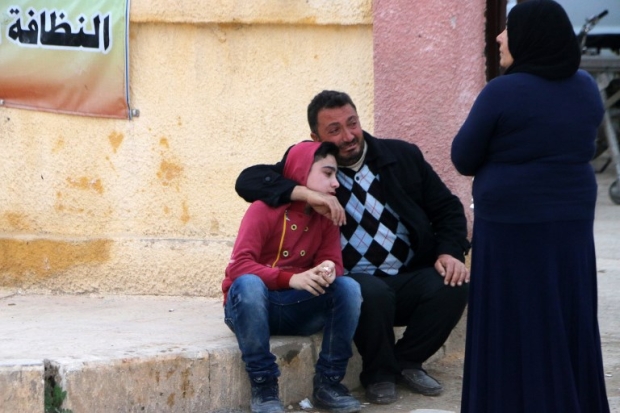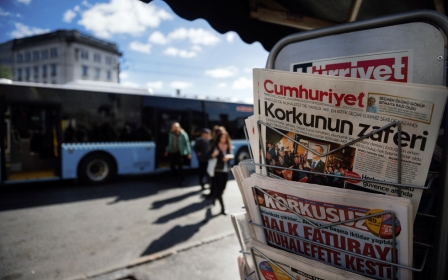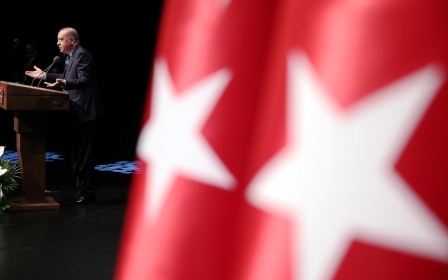The myth of national unity is destroying Turkish media
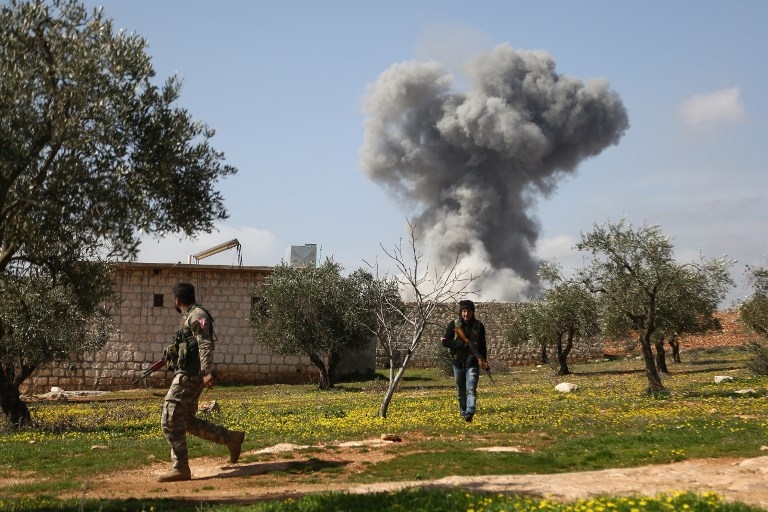
Turks abroad learned a very long time ago not to be shocked by the absurd news coming out of the land we call home.
So, when I stumbled upon a story on my newsfeed late last month about a Turkish news anchor not-so-tacitly threatening to kill people living in the “secular” Istanbul neighbourhoods that I spent most of my teenage years in, my reaction was limited to a deep sigh.
The news anchor in question, Ahmet Keser, made the controversial remarks in his morning show on Akit TV, sister television channel to the ultra-conservative and conspiracy-ridden pro-government daily newspaper YeniAkit. Responding to allegations that the Turkish military has killed civilians in Syria's Afrin, Keser said: “[They claim] the army of the Turkish republic is killing civilians [in Afrin] … why would the army go there to kill civilians?
"If we had the intention of killing civilians, we would have started from Cihangir, Nisantasi, Etiler, right? I mean there are lots of traitors there … also in the Turkish parliament."
Attempt to 'sabotage our nation's unity'
His comments were undoubtedly disturbing, but not unexpected - Keser and his Akit colleagues have been accused of racism, anti-semitism, misogyny, using anti-LGBT slurs and disseminating hate speech many times before.
But the Turkish public - and rather more surprisingly, the Turkish government - did not let this apparent attack on Turkey's secular middle class pass quietly: Keser was swiftly forced to resign.
The lack of fact-checking and the blind faith in any positive reports about the operation has reached unprecedented levels
Asked about Keser's comments, the spokesperson for Turkey’s governing AK party, Mahir Unal, said that "Istanbul prosecutors have started an investigation".
"We would never accept this, we would never approve of this," Unal added. "This is an attempt to sabotage our nation's unity."
The government's strong, no-nonsense reaction to the saga was a relief for some members of the Turkish opposition, who - especially after the Gezi Park protests of 2013, in which they were branded as "looters" by none other than President Recep Tayyip Erdogan himself - were increasingly feeling targeted in their own country.
But unfortunately, the government's reaction to Keser's words was nothing more than a welcome blip. That the government might be willing to prevent a news anchor from musing about the elimination of a section of Turkish society on national TV is a welcome development, but the demonisation of opposing viewpoints and the persecution of pro-Kurdish voices is still a big problem in Turkey.
Guidelines for covering the Afrin operation
On the day Turkey's operation in Afrin, dubbed Olive Branch, started in late January, Turkish Prime Minister Binali Yildirim hosted representatives from the country’s leading media organisations in the Vahdettin Pavilion in Istanbul.
Alongside the usual names from pro-government media outlets, representatives of Turkey's secular, Kemalist and traditionally anti-Erdogan news organisations were also present - mostly because they are fully supportive of the Turkish military’s operation against the Kurdish YPG in Syria.
The purpose of the meeting was to give journalists "recommendations" on how to report on the operation. According to the Turkish media and some journalists who attended the meeting, a 15-point list of recommendations was presented, including instructions on how coverage should emphasise that the military onslaught is against "terrorist organisations" - including the Islamic State, which currently has no presence in Afrin - and how the Turkish military would do its utmost to protect civilian lives.
The journalists were also encouraged not to quote negative news reports from foreign news outlets about the Turkish military’s actions in Afrin in their domestic coverage.
The military claimed to have "neutralised" thousands of "terrorists" in Afrin without killing a single civilian, and all the mainstream media outlets reported these - objectively unbelievable - figures without question.
The motivation for Olive Branch also remained unquestioned, and the "strategic necessity" of the cross-border operation was taken as a given. The handful of reporters that were sent to the frontlines with state accreditation stuck to repeating government and military soundbites.
Critical voices silenced
The lack of fact-checking and the blind faith in any positive reports about the operation has reached unprecedented levels. The climax came when Haberturk, one of Turkey's most popular news channels, broadcast a video clip taken from the popular computer game Medal of Honor, claiming that it depicted the frontlines of the Afrin operation.
All in all - whether as a result of government pressure, self-censorship, eagerness to please a public overwhelmingly supportive of the incursion, or an honest, nationalistic belief that the military can make no mistakes - the mainstream media failed to give space to an objective debate about Operation Olive Branch.
In the meantime, rare critical voices were swiftly silenced by the state, even on social media platforms. Only a couple of days after the start of the operation and the prime minister’s meeting with the media in Istanbul, dozens of people, including politicians, journalists and activists, were arrested for "spreading terrorist propaganda" about the Syria incursion.
Turkey's state-run Anadolu Agency said that 91 people had been detained in the two days following the start of the operation in raids against “black propaganda” across 13 provinces. Following the raids, Yildirim said the government had started holding people accountable for attempts to “smear the operation that serves peace”.
"Our government's priority is the safety of life and property of every single civilian in our country and in the region," Yildirim said. "Some know-it-alls comment on [alleged civilian deaths], but they do not realise that when they talk like that, they are serving the agenda of a terrorist organisation."
Propaganda wars
Late last month, the Turkish government passed a draft bill that would require online broadcasters to be licensed and regulated by the national TV and radio watchdog RTUK. If the new bill becomes law, it would give authorities broad scope to target any internet broadcasting content, including independent news websites that are critical of the government.
Transportation Minister Ahmet Arslan, who also oversees internet regulation, said broadcast material that goes "against national security [and the] moral order of the country" would be blocked if the bill is written into law.
These are all signs that the silencing of critical voices in Turkey is only the beginning.
Also, since the start of the operation, Turkish social media has been swamped with counter-propaganda attempts, with devastating pictures of injured and murdered children from different battlefronts in Syria being serviced as if they were from Afrin.
Toxic nationalism
Of course, none of this is justification for either the silencing of voices against Operation Olive Branch in Turkey, or the mainstream Turkish media's superficial and one-sided representation of developments at the country's southeastern border.
By classifying any criticism of a military operation as treason and support for terrorism, Turkey is going down a path that leads to nothing but toxic nationalism and further deterioration of the right to democratic expression.
We all witnessed how members of the US media contributed to the devastation caused by the US in the aftermath of the 9/11 attacks by discarding their journalistic standards and scepticism about the state’s military incursions in the name of national unity and jingoism.
The Turkish media is currently falling into the same trap.
- Birce Bora is a London-based Turkish journalist and researcher. She holds a PhD in Journalism from City, University of London. Her thesis examined the representation of Turkey in the British print media between 2007-13.
The views expressed in this article belong to the author and do not necessarily reflect the editorial policy of Middle East Eye.
Photo: Turkish-backed Syrian opposition fighters are seen in the village of Jamanli, northeast of the Syrian city of Afrin, on 3 March 2018, as smoke billows in the background from a reported YPG location (AFP)
This article is available in French on Middle East Eye French edition.
Middle East Eye propose une couverture et une analyse indépendantes et incomparables du Moyen-Orient, de l’Afrique du Nord et d’autres régions du monde. Pour en savoir plus sur la reprise de ce contenu et les frais qui s’appliquent, veuillez remplir ce formulaire [en anglais]. Pour en savoir plus sur MEE, cliquez ici [en anglais].



